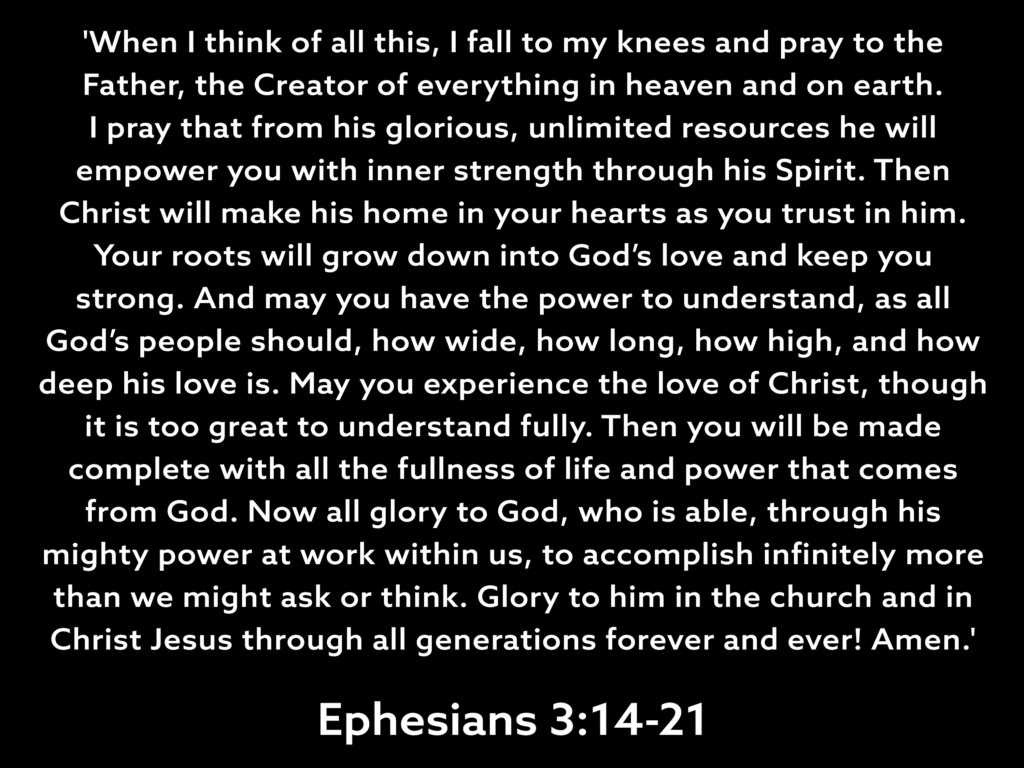Pastor Craig Carter
It’s hard to believe, but the campaigning for the 2020 presidential election is in full swing. For the candidates trying to find “the it factor” among voters, they’d probably do well to steal a page from the playbook of one of the greatest campaigners of all time – former President Clinton.
During the 1992 presidential campaign, George Bush, Sr. and Bill Clinton were virtually deadlocked in the polls. As Election Day drew closer, President Bush began to pull ahead. That’s when James Carville, one of Clinton’s top advisors, decided their campaign effort needed a new focus. After some in-depth research into the wants and desires of the American populace, he designed a game plan based on voters’ main concern. Carville wrote four simple words on whiteboards and sticky notes that Clinton was forced to see on a continual basis throughout the day in order to remind him of what was really important to the voting public: “It’s the economy, stupid!” Armed with that focus, Clinton defeated the incumbent president.
I don’t know about you, but I need to keep a similar message in mind in order to make sure I remained focused on life’s greatest priority – “It’s the relationships, stupid!”
The Bible makes it clear that relationships are to be central – between human beings and their God and with one another. This is evident in the Ten Commandments where the first four deal with our relationship with God and the other six deal with our relationship with others. The commandments are not simply do’s and don’ts. Rather, they create boundaries for healthy relationships with God and others. They teach us how to “keep the main thing the main thing.”
When Jesus was asked about the most important thing to keep in mind, He replied, “The most important commandment is this: ‘Listen, O Israel! The LORD our God is the one and only LORD. And you must love the LORD your God with all your heart, all your soul, all your mind, and all your strength.’ The second is equally important: ‘Love your neighbor as yourself.’ No other commandment is greater than these.” (Mark 12:29-31 NLT)
In other words, life is all about God (“the one & only Lord”). Given that fact, we are to concentrate our attention on developing and maintaining loving relationships – with God, with others, and with ourselves.
Unfortunately, in the hectic world in which we live, it’s easy to lose focus, isn’t it? We allow “to-do” lists to take priority over spending time with God. We let duties at work take precedence over family time. We are too busy to take time for ourselves.
Some way, somehow, we have to keep in mind, “It’s the relationships, stupid!” Hurricane Michael and its aftermath reinforced this important truth, didn’t it? In those difficult days that followed Oct 10th, we pulled together as a community, spent time with our neighbors, and treasured every moment together.
But over time, we have slipped back into familiar patterns of behavior and allowed things to take precedence over people … at least I have. I frequently find myself more concerned about getting the house repaired, putting the fence back up, watching TV, and the list goes on.
You and I will never have “it” and keep “it” unless we keep in mind: “It’s the relationships, stupid! Life is best lived when it’s focused on relationships.”
In particular, using Jesus’ own words as a guide, a God-centered life (one that is all about Him) focuses on loving relationships with the Lord, with others, and with ourselves
1) Relationship with GOD
“You must love the LORD your God with all your heart, all your soul, all your mind, and all your strength.” (Mark 12:30 NLT)
Since life is all about God, it necessarily follows that a relationship with Him is to take center stage in our lives. Christianity is a relationship more than a religion. And the sort of relationship the Lord wants with us as His children is one that is characterized by genuine love. More than anything else, God wants our love. Here’s the way the Lord put it thru the words of the prophet, Hosea: “I don’t want your sacrifices – I want your love. I don’t want your offerings – I want you to know me.” (Hosea 6:6 LB)
The reason is because God first loved us; in return, He wants us to love Him back. So, as Jesus said in the Great Commandment, this should be our highest aim. And we’re not just to love God a little bit – we’re to give Him our full attention. We’re to love Him with our emotions, our wills, our thoughts, and our actions. “I surrender all” are wonderful words to sing, but a more wonderful way to live.
As I’ve shared before, I accepted Christ and was baptized at age 7, but I slowly drifted away from the Lord during my young adult years. Through a series of events in my mid-twenties, I ended up at a retreat at Blue Lake Methodist Camp near Andalusia, AL.
At that time, I had been living with one foot in the world and one toe in the church, and I was miserable. In response to the evangelist’s invitation at the Saturday evening service, I went to altar, knelt, and prayed this highly spiritual prayer: “God, as best I can, I’m giving you my whole life. If you can do anything good with me, so be it. If not, I’m going to forget this thing called Christianity and ‘eat, drink, and be merry!’”
There were no lightning bolts, no tears, no speaking in tongues … but something happened and I left Blue Lake a different person. My wife Lee can attest to that. From that point forward, I got “it” because He got hold of me.
How about you? Do you have “it”? Do you know how much God loves you? Have you responded to His love by giving Him your heart and life? Are you living for God and God alone? If there anything that’s getting in the way of wholehearted devotion to Christ?
2) Relationship with OTHERS
The second is equally important: “Love your neighbor as yourself.” (Mark 12:31a NLT)
Having learned to love God, we are then, in turn, to love those around us. In other words, our relationship with God is lived out through relationships with other people. You and I have been made, not to live in isolation, but in community with others. That’s why relationships can be both a blessing and a curse. When they’re right, life is good. But when they’re not, well, you know…
It’s imperative we find ways to develop godly, loving human relationships. Human relationships are developed through PERSONAL ENCOUNTERS and SHARED EXPERIENCES.
Personal encounters mean that we take time for one another and give our attention to people rather than to things. The fertile soil in which good, loving relationships grow is availability. I wonder how many relationships we miss out on or sabotage because we’re too busy or too preoccupied with all sorts of other “stuff.”
Most of you know that I was raised Southern Baptist, the son of a Baptist deacon. So how did I become a Methodist? It all began with a personal encounter.
When I was assigned to Eglin Air Force Base, I began looking for a church in Fort Walton Beach. When I didn’t feel at home at several Baptist churches I visited, I decided one Sunday to try the First United Methodist Church. After the service, as I was trying to slip out unnoticed to go meet my roommate at the beach, a man by the name of Pete Peterson literally accosted me. He invited me to join him for a cup of coffee in the fellowship hall. I politely declined, telling him I didn’t drink coffee. He replied, “You drink Cokes?” … “Yes” … “Then let me buy you one.” Next thing I knew I was drinking a Coke in the fellowship hall, being introduced to other church members, and then attending Sunday School. I was hours late meeting my roommate at the beach, but guess where I was the following Sunday? Back at FUMC.
I didn’t know anything about Methodist theology, but I did know that this particular group of Methodists was friendly and they seemed to care about me. And because of that personal encounter, I became a Methodist and ended up a Methodist pastor. Little did Pete Peterson know what an impact he was going to have on me and ultimately on his church and denomination!
Every day, you and I have all kinds of opportunities to interact with persons around us. But do we take advantage of them? Are we using those encounters to develop relationships with others?
Taken to another level, what begin as encounters become shared experiences. Experiences occur when we “do life together.” Relationships with others grow and flourish when we spend lots of time with one another and make memories in the process.
Out of that one personal encounter at FUMC a number of relationships developed. The most significant one involved two people who became my “spiritual parents.” As Lee and I started attending the church, we got acquainted with John and Irene McWhorter. We were about the ages of their children who were away at college, so they “adopted” us. They had us over for dinner, they asked us to attend their home Bible study, they invited us to join their family for picnics, etc. There was no doubt John and Irene had “it,” and Lee and I wanted what they had.
As a result of spending time together, we “caught” what they had – an authentic, vital relationship with the Lord.
A God-centered and God-honoring life focuses on relationships that begin with personal encounters and grow through shared experiences.
3) Relationship with OURSELVES
“Love your neighbor as yourself.” (Mark 12:31a NLT) Did you know it’s okay to love yourself? After all, God does, so why shouldn’t you?
Like all relationships, a healthy relationship with one’s self begins with awareness – which in this case is a self-awareness. When we truly learn that our identity is found in Christ – when we discover that we are the adopted children of God – we then need to relate to ourselves accordingly. That is, we must treat ourselves with love and respect.
As singer Gloria Gaynor said, “I’m no better than anyone else…but no one else is better than me.” That’s the attitude of those who have “it” and understand how to love themselves.
We maintain a loving relationship with ourselves in two significant ways:
– By talking to ourselves in respectful, loving ways:
You and I can’t be in a good relationship with another person if we speak ugly of that person, or are accusative or condemning in our tone. Yet, many times, if you’re like me, we talk to ourselves that way by saying things like, “I’m an idiot…I’m worthless…I’m no good…” Check yourself when that happens and say, “Don’t speak to me that way!”
– By taking time for ourselves
How do you spell “love?” T-I-M-E. Good, healthy relationships take time and we need it for ourselves as well. This is another area many of us, including myself, need to improve on. You and I will be of more use to God and to others when we begin to take better care of ourselves.
If we want “the it factor,” we have to acknowledge that it’s all about God and it’s focused on relationships – with the Lord, with others, and with ourselves. Is there anything that stands in the way of you loving God wholeheartedly and loving your neighbor as yourself? Repent of it and resolve to change course.
Do you want “it?” Let’s pray using “The It Prayer”:









